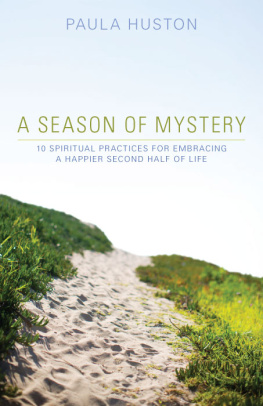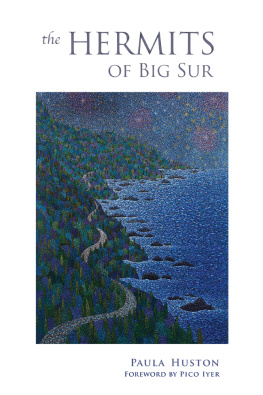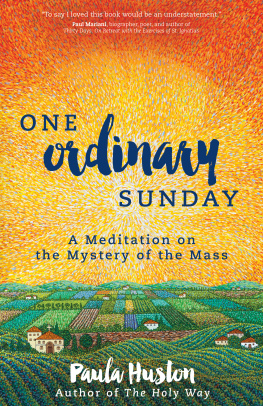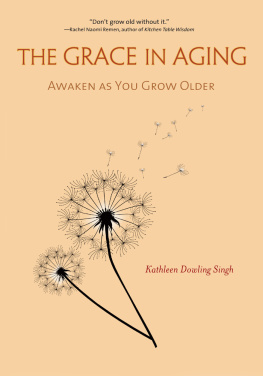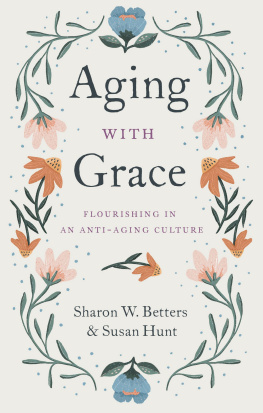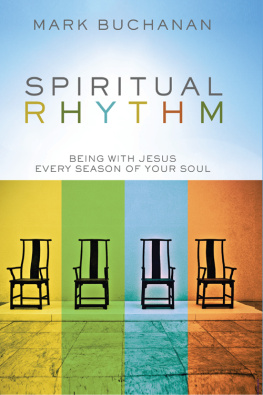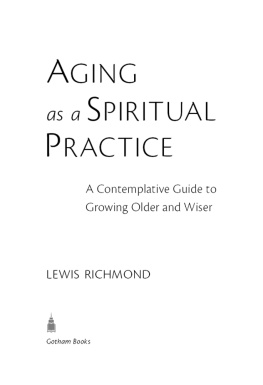
Loyola Press
3441 N. Ashland Ave.
Chicago, IL 60657
(800) 621-1008
www.loyolapress.com
2012 Paula Huston
All rights reserved.
Authors note: A couple of names and several details have been changed to protect the privacy of those I have written about.
All Scriptures, unless otherwise noted, are taken from the New Revised Standard Version Bible: Catholic Edition, copyright 1980, 1993. Division of Christian Education of the National Council of Churches in the U.S.A. Used by permission. All rights reserved.
Art credit: Veer/Alloy Photography
Library of Congress Cataloging-in-Publication Data
Huston, Paula.
A season of mystery / Paula Huston.
p. cm.
Includes bibliographical references.
ISBN-13: 978-0-8294-3754-6
ISBN-10: 0-8294-3754-1
1. Middle-aged persons--Religious life. 2. Older Christians--Religious life. 3. Spiritual life--Catholic Church. I. Title.
BV4579.5.H87 2012
248.8'4dc23
2012026229
ePub ISBN 978-0-8294-3755-3
12 13 14 15 16 EPUB 5 4 3 2 1
I am studying a photo of my mom in Barcelona, a picture taken twenty-five years ago; in it she is the age I am now. A slim brunette sitting in the shadows of a Moorish hotel garden beside my handsome dad, she could be thirty-five, forty, or even a young fifty, but surely not what she actually is: about to begin her seventh decade. She has never been to Spain before. They are here to celebrate their anniversary, and there is no hint on her calm and happy face that within four years of this culminating moment, she will be a widow and that life will have changed forever.
Old age is a mystery. It steals in upon us and quietly relieves us of our youth and our beloveds. Once it has arrived, it stays, and the indelible marks of our decay begin to appear upon our faces. In its grip, our path starts to veer, and eventually we find ourselves standing before that daunting gateway called death. Whatever we have managed to hold on to during the silent struggle with aging must now be relinquished forever. Our time is up, our journey over. And, faith or no faith, what happens next is shrouded in obscurity.
Right now, I am my mom in Barcelona. At almost sixty, I can still pass for middle-aged, and its easy to convince myself that what happened to herearly widowhood, a potentially lethal illness, the inexorable crumbling of her dark-eyed beautywill never happen to me. After all, I am at the top of my game. I can still hoist a grandchild in each arm, write books, teach, jog, and backpack. Im clearly too strong and healthy to get old, so what do I have to fear?
My culture heartily concurs and offers me two inspiring myths. The first is that technology is my friend, and if only I am willing to tap into its wondrous resources, I never have to age or die. The second myth is loftier and does not concern itself with wrinkle abatement; instead, it assures me that the older I get, the more fascinating, wise, and powerful I am destined to become.
The first myth, clearly corporate-sponsored, encourages me to spend a lot of money on health supplements, gym memberships, plastic surgery, and hormone replacement therapy. The second taps into my unrealized ambitions and leads me to seek gurus who can bring me forth into full blossom. Underlying each is the same unquestioned modern belief: the purpose of life is to get what I most want before I die. Postponing aging buys me the time to do that, and believing in myself, as the gurus put it, provides the necessary inspiration.
If my culture is right about thisand it does make a passionate case for itselfthen my job from now on becomes clear. I must avoid aging at all costs. I must live as though there is no death. And most of all, I must strive harder than I ever have before to achieve my unrealized aspirations, obtain what I desire but still lack, and come into my own as a self-fulfilled, autonomous being.
So why does such stirring rhetoric make me feel so tired?
One of the great minds of the twentieth century, philosopher and novelist Iris Murdoch, speaks of the consoling illusions we so readily embrace. Such fantasies make us feel better when we are hurting or even help us bear real suffering. They inspire us to higher purposes; they sustain us for the long haul. What then can be wrong with them? Her answer is simple: they shield us from the truth. And since we are truth-seeking creatures, ultimately such fantasies cannot satisfy.
If our two modern myths about aging are really just consoling illusions, then where can we find a more truthful view? If our cultures underlying belief about the purpose of life is misguided, then where shall we go for wisdom?
These questions are crucial, because if there is one thing I have learned from my mothers slow decline, it is this: old age is the most challenging stage of life we face. We must be able to tap into all the wonderment of childhood, the hope of young love, the patience of parenthood, and the determination of middle age if we are not to be defeated by it. Yet it is calling us to be better people than weve ever been, while at the same time, it is diminishing our capacities for serious effort. The irony of old age, which slowly reduces us to infancy, is that we must be true adults to survive it.
Right now I am my mom in Barcelona. In twenty-five years, if I am still here, I will be as gray and unsteady on my feet as she is rapidly becoming. My children will be trying their best to take the car away, to help me update my will, to get me into a senior residence where nurses can dole out my medications. Ill be wearing hearing aids and mixing up dates and forgetting to turn off the flame on the stove. No matter how much money I have spent on hormones and health supplements, no matter how many gurus I have consulted, I will be old.
And theres no getting out of it.
There is, however, a different way to face it. And there are at least three good reasons for doing so. The first is that we can avoid a lot of unnecessary brooding and unhappiness. The second is that we can live a better life. The third is that we can more easily prepare ourselves for death and what follows afterward.
The cultural belief that getting what we most want will make us happy is not a new one. It has cropped up regularly for millennia, and every time it does, it is disproved by the facts. Fabulously wealthy peoplesuperstars and celebrities and CEOstheoretically have the resources and freedom to obtain whatever they most desire. Yet they are famously dissatisfied, plagued by restless boredom as they endlessly seek what will finally bring them peace.
The rest of us, with fewer dollars or hours to spend on the quest, do not escape the suffering. We feel cheated out of what we deserve. We feel like failures. We become envious and resentful of those who have what we want. Equally dissatisfied, we are ripe for depression and anger, both of which get dramatically compounded when we face the inevitable losses of old age.
Setting aside the fruitless quest to get everything we want before we die, then, frees us up to become better human beings. Philosophers have long pointed out the difference between the enviable life and the admirable life. The first may be aesthetically tasteful and filled with interesting adventures: we keep a yacht in the Bahamas, climb Mount Everest, collect masterpieces, or make great wine. The second may be less pleasing, at least on the surface: we pour ourselves out in a Calcutta hospital for the dying, adopt a crack baby, take care of our Alzheimers-stricken father for a decade before he dies.

